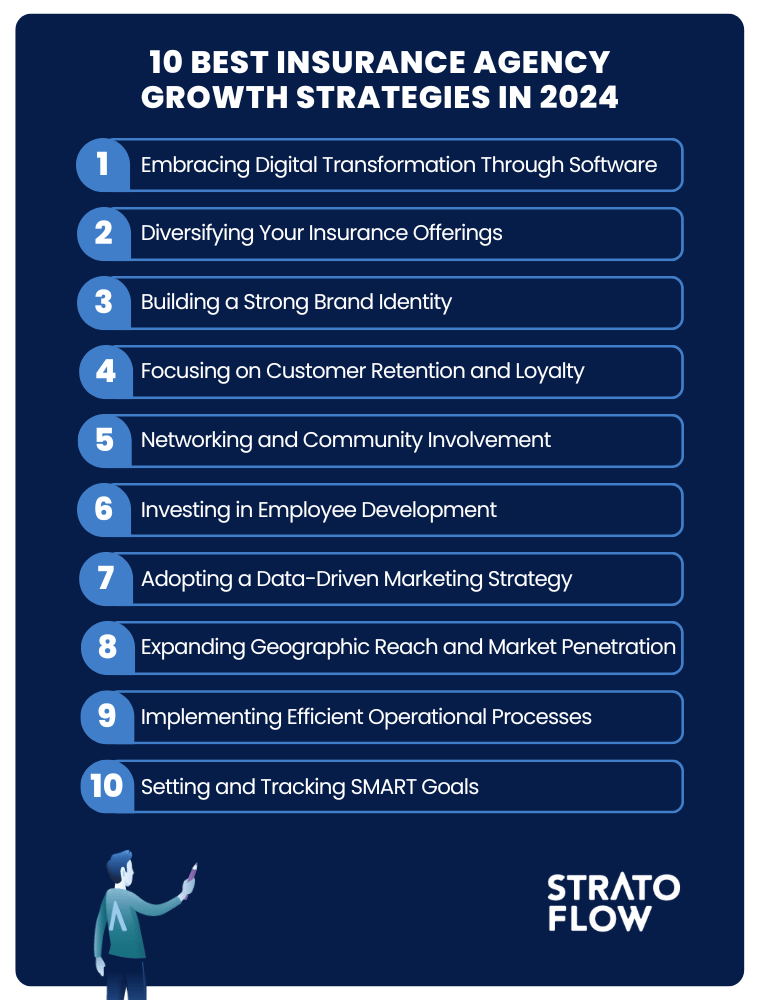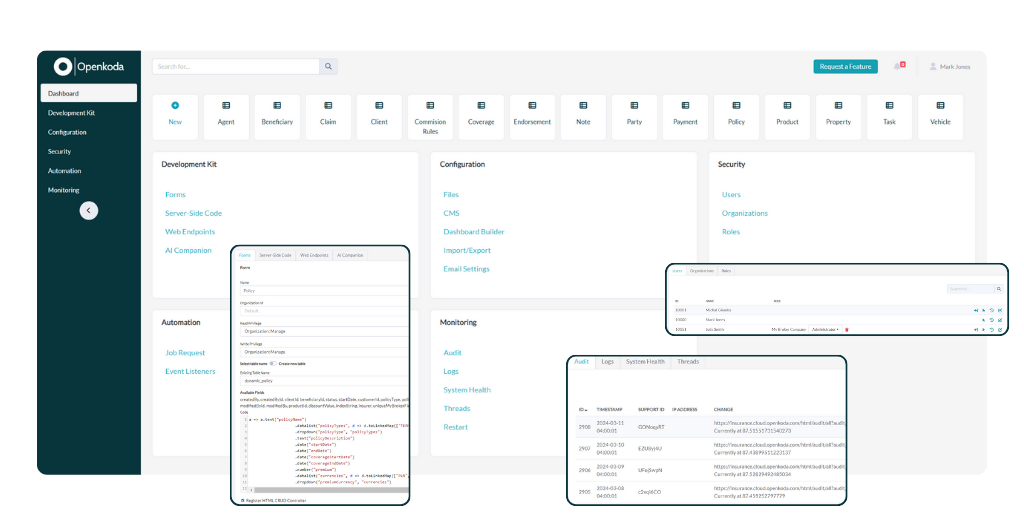
Looking for concrete ways to grow your insurance agency in 2024?
This article spotlights ten insurance agency growth strategies that are practical, straightforward, and effective.
Cut through the complexity and discover how to harness technology, broaden your service offerings, and engage with your community to not just meet but exceed your growth targets.
As we enter second half of 2024, insurance companies are constantly looking for effective strategies to outpace the competition and connect more meaningfully with their customers.
In a year marked by significant technological advancements, mostly in the AI field, and evolving customer expectations, finding innovative ways to grow has never been more important.
Here, we explore ten essential strategies that can help insurance companies expand their market presence, refine their offerings, and solidify their position in a competitive industry.


In a world increasingly driven by technology, insurance agencies must embrace digitalization in insurance to stay competitive and become successful insurance agency. Using digital tools isn’t just a a way to promote your business online as it was 10 years ago; in 2024 it’s key to improving business efficiency and reaching new customers.
Incorporating digital records and providing online access to policies and claims information significantly improves the customer experience.
Implementing custom insurance software solutions is a strategic advantage that can significantly differentiate an insurance company in a crowded marketplace.
Custom Insurance software addresses the unique challenges and requirements of a particular insurance business, enabling more efficient operations, improved customer experiences, and the agility to adapt quickly to market changes. This customized approach ensures that the technology not only meets the company’s current needs, but also scales as it grows, providing a competitive advantage by improving service delivery, operational efficiency, and data analysis capabilities.
So, what are your options when it comes to software solutions used in insurance companies?
Key apps include:
As you can see there are various options available on the market, each designed to support very specific insurance business needs and it’s up to you to decide which one should have the top priority.
The insurance market is a complex and niche space. That’s why, when developing custom insurance software, it’s critical to partner only with custom insurance software development companies that have a deep understanding of the insurance industry and extensive experience in the field.
Choosing the best insurance agency management software is a critical decision for companies operating in the insurance market, as the right system can streamline operations, improve customer service, and increase overall efficiency.
It’s essential for insurance companies to select a platform that offers robust features such as customer management, policy administration, claims tracking, and analytics to stay competitive and responsive to customer needs.
Let’s look at Openkoda Policy Management System since it is one of the prime examples of modern insurance software systems that adress key pain points that insurance professionals struggle with.
Its key features include:

Openkoda serves as a solid open-source foundation upon which companies can craft management systems tailored to their unique needs.
With a customized interface, Openkoda‘s comprehensive dashboard provides direct access to key metrics for monitoring and in-depth analysis.
Insurance agencies, including independent insurance agencies, can use data analytics to predict future business results, allocate resources efficiently, and minimize customer acquisition costs (CAC) in the insurance business.
This is achieved by analyzing historical data patterns, market trends, and consumer behavior to predict future demand for various insurance products and services.
Such insights enable more informed decisions about product offerings and market positioning, improving the ability to effectively meet consumer needs.

Offering a variety of insurance products, including different types of insurance, is a proven growth strategy that helps manage risk and promotes sustainable agency growth. Offering a broader range of products allows agencies to meet a wider range of client needs, thereby improving client retention and lifetime value.
Cross-selling and upselling techniques can boost revenue by providing existing clients with additional products and services. Agents can pinpoint more relevant products for clients by identifying insurance needs that arise during changes in a customer’s life.
Offering customer incentives and adjusting commission structures can incentivize agents and expand the customer base.

Building a strong brand identity is more than a marketing strategy; it’s a way to differentiate an insurance agency from the competition. A well-developed brand identity fosters:
Developing a unique selling proposition (USP) sets an agency apart in the marketplace by highlighting its distinctive values and benefits. By creating clear and relevant messaging around a key differentiator, a well-crafted USP can be memorable to potential clients and help promote the agency.
An enhanced online presence is essential in today’s digital age. This includes developing a content marketing plan, leveraging social media platforms, and making your agency easily accessible and engaging online. These efforts will not only increase awareness, but also attract customers and expand your client base.

Prioritizing customer retention and loyalty is a critical growth strategy for insurance agencies. Delivering exceptional service to all customers helps agencies build a positive reputation and generate referrals that are essential to growing their business.
Delivering personalized services boosts customer satisfaction and nurtures enduring relationships. Anticipating customers’ needs allows insurance agencies to offer more relevant product suggestions and support, significantly improving their customer service.
Customer loyalty programs are an effective way to incentivize clients to refer new customers and remain loyal to the agency. Offering rewards during key customer moments can enhance customer satisfaction and retention.

Networking and active participation in the community are vital growth strategies for insurance agencies. Some ways to implement these strategies, which can help in becoming a successful insurance agent, include:
These activities allow independent agencies, including their own agency, to broaden their networks, showcase their expertise, and demonstrate their commitment to community enrichment.
Attending insurance industry conferences and events has many benefits for independent insurance agents. These platforms provide valuable insight into industry trends and developments, and facilitate networking with other professionals, including meeting an insurance agent from different companies.
Engaging in community outreach can have several benefits for agencies, including:

Investing resources in employee development through learning and development programs increases agent confidence, motivation, and productivity. This investment also prepares agents to stay abreast of changing insurance products, regulations, and market trends, improving their ability to serve customers effectively.

The adoption of a data-driven marketing strategy empowers insurance agencies to:
Employing customer segmentation allows insurers to:
Tracking and analyzing marketing metrics is critical to understanding the effectiveness of data-driven strategies and ensuring a positive return on investment. By tracking key performance indicators such as contact rates, quote rates, and bind rates, agencies can assess their productivity and refine their strategies accordingly.

Expanding geographic reach and market penetration through mergers, acquisitions and niche market targeting can quickly increase an insurance agency’s market share, revenue and customer base. Integrating another agency allows an insurance company to gain a competitive edge by expanding its market presence.
Targeting niche markets is a proven growth strategy for insurance agencies. By offering tailored insurance solutions that resonate with a specific market segment, agencies can create a compelling USP and attract more customers.

Implementing efficient operational processes and streamlining workflows is essential to prevent errors, ensure that critical tasks are not overlooked, and increase operational efficiency. Through the use of digital tools and customized calendars, insurance agents can effectively manage their time and monitor their progress.
Streamlining workflows is a critical strategy for improving operational efficiency. By streamlining and simplifying processes, agencies can increase efficiency, minimize redundancy and improve overall productivity.
Regular monitoring and evaluation of new processes is critical to validate their effectiveness and identify potential for further workflow improvements.
Automating routine tasks can significantly enhance operational efficiency. Tasks like data entry and policy issuance can be automated to reduce paperwork, streamline the purchase process, minimize human error, and increase productivity.

The establishment and monitoring of SMART goals offer a structured growth framework and keep team efforts synchronized. Covering various business areas, such as general business goals, operations goals, and precise sales targets, enables insurance agencies to assess their success and make data-driven decisions.
Establishing SMART goals provides a clear and focused path for insurance agents to achieve business objectives. By setting goals that are:
Independent agents can pinpoint key areas of growth and track their progress towards these aims.
Monitoring progress and adjusting strategies is crucial for achieving SMART goals. Regular performance evaluations and a clear roadmap with short-term milestones enable adaptability and ensure that goals are always aligned with the agency’s vision and mission.

In conclusion, the insurance industry is a dynamic realm where growth strategies are key to thriving and staying competitive. By embracing digital transformation, diversifying offerings, building a strong brand identity, focusing on customer retention, networking, investing in employee development, adopting a data-driven marketing approach, expanding geographic reach, implementing efficient operational processes, and setting SMART goals, insurance agencies can achieve sustainable growth and success.
To grow in the insurance industry, take advantage of the skills shortage, focus your efforts, create a development plan, and stay updated with the latest trends. These steps can help you boost your career in insurance.
A good profit margin for an insurance agency typically ranges between 2 percent and 10 percent. It’s important to consult with an accountant or tax advisor for your specific agency.
Digital transformation is important for insurance agencies because it improves efficiency, extends reach to new clients, and provides a competitive edge in the evolving industry. It helps in staying ahead of the competition and meeting the needs of modern consumers.
Diversifying insurance offerings helps manage risk, ensures sustainable growth, and improves customer retention, ultimately benefiting the company.
Building a strong brand identity benefits insurance agencies by differentiating them from competitors, fostering customer trust, and enhancing customer loyalty. This ultimately leads to increased business success and growth.
Thank you for taking the time to read our blog post!